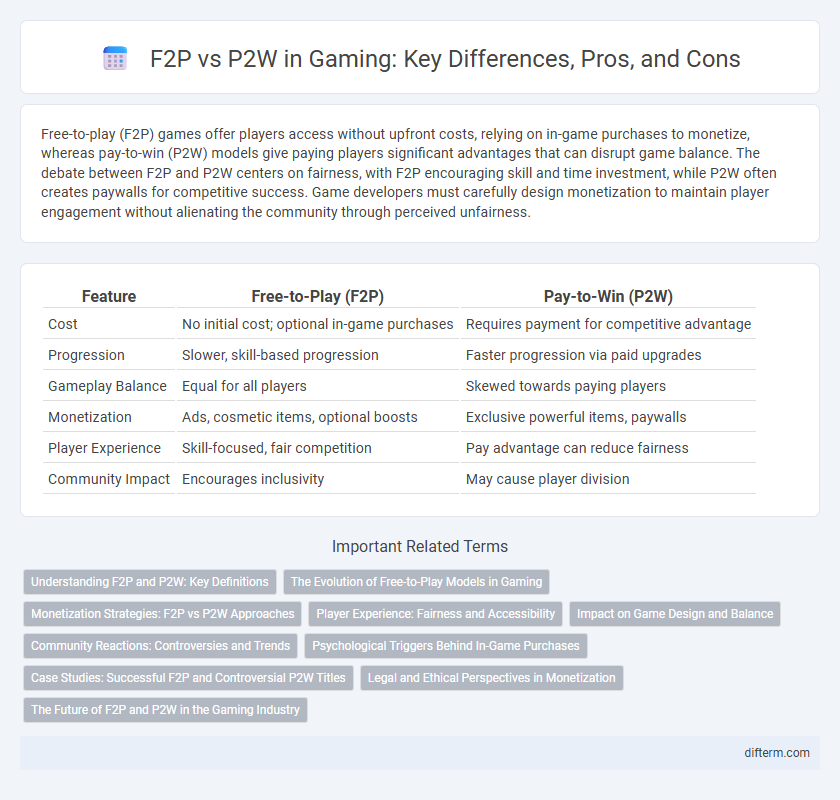Free-to-play (F2P) games offer players access without upfront costs, relying on in-game purchases to monetize, whereas pay-to-win (P2W) models give paying players significant advantages that can disrupt game balance. The debate between F2P and P2W centers on fairness, with F2P encouraging skill and time investment, while P2W often creates paywalls for competitive success. Game developers must carefully design monetization to maintain player engagement without alienating the community through perceived unfairness.
Table of Comparison
| Feature | Free-to-Play (F2P) | Pay-to-Win (P2W) |
|---|---|---|
| Cost | No initial cost; optional in-game purchases | Requires payment for competitive advantage |
| Progression | Slower, skill-based progression | Faster progression via paid upgrades |
| Gameplay Balance | Equal for all players | Skewed towards paying players |
| Monetization | Ads, cosmetic items, optional boosts | Exclusive powerful items, paywalls |
| Player Experience | Skill-focused, fair competition | Pay advantage can reduce fairness |
| Community Impact | Encourages inclusivity | May cause player division |
Understanding F2P and P2W: Key Definitions
Free-to-play (F2P) games allow users to access the core gameplay without initial purchase, often monetizing through in-game purchases like cosmetic items or convenience boosts. Pay-to-win (P2W) models provide paying players with significant advantages, including powerful equipment or faster progression, which can disrupt game balance. Understanding the distinction between F2P and P2W is essential for players seeking fair competition and developers aiming for ethical monetization.
The Evolution of Free-to-Play Models in Gaming
Free-to-play (F2P) models have evolved significantly, shifting from simple cosmetic purchases to complex in-game economies balancing player engagement and monetization. Developers increasingly integrate ethical design principles to avoid pay-to-win (P2W) pitfalls, fostering fair competition and long-term player retention. Data-driven personalization tailors content monetization without compromising gameplay fairness, reshaping F2P strategies in modern gaming ecosystems.
Monetization Strategies: F2P vs P2W Approaches
Free-to-play (F2P) games monetize through microtransactions, cosmetic items, and battle passes, ensuring accessibility while generating revenue from optional purchases. Pay-to-win (P2W) models prioritize selling power-ups or advantages, often creating imbalance by allowing paying players to progress faster or dominate gameplay. Effective monetization strategies balance fair player engagement and profitability by aligning in-game rewards with purchase incentives without compromising competitive integrity.
Player Experience: Fairness and Accessibility
Free-to-play (F2P) games prioritize accessibility, allowing a broad audience to enjoy content without upfront costs, fostering a diverse player base. Pay-to-win (P2W) models often create imbalance by granting paying players significant in-game advantages, which can diminish fairness and discourage skill-based competition. Ensuring fair matchmaking systems and rewarding player skill are critical to maintaining engagement and long-term retention in both F2P and P2W gaming environments.
Impact on Game Design and Balance
F2P (Free-to-Play) games emphasize accessible gameplay and community growth, often relying on cosmetic purchases to maintain balance and fairness, avoiding pay-to-win mechanics that can disrupt competitive integrity. P2W (Pay-to-Win) models introduce significant advantages for paying players, such as exclusive gear or stat boosts, which can unbalance multiplayer environments and diminish enjoyment for non-paying users. Game designers face challenges in balancing progression and monetization, aiming to retain player engagement while preventing paywalls from undermining skill-based competition.
Community Reactions: Controversies and Trends
Community reactions to Free-to-Play (F2P) versus Pay-to-Win (P2W) mechanics in gaming often spark intense debates, with many players criticizing P2W models for undermining fairness and competitive integrity. Controversies emerge around monetization tactics that favor paying players, leading to fragmented communities and calls for regulatory oversight in game economies. Trends indicate a growing demand for balanced F2P experiences that emphasize skill and progression over financial investment, influencing developers to adopt hybrid monetization strategies.
Psychological Triggers Behind In-Game Purchases
Psychological triggers such as the fear of missing out (FOMO), variable reward schedules, and social comparison drive players to make in-game purchases, influencing the dynamics between free-to-play (F2P) and pay-to-win (P2W) models. F2P games often use scarcity and limited-time offers to encourage spending, while P2W systems leverage progression advantages and status elevation to tap into players' competitive instincts. Understanding these triggers is essential for developers to balance monetization strategies without alienating the player base.
Case Studies: Successful F2P and Controversial P2W Titles
League of Legends exemplifies a successful free-to-play (F2P) model, generating revenue through cosmetic microtransactions without impacting competitive balance, fostering a massive player base and esports ecosystem. Conversely, games like Clash of Clans face criticism for pay-to-win (P2W) mechanics that allow players to accelerate progress through purchases, creating fairness issues and community backlash. These case studies highlight the financial viability of F2P while emphasizing the reputational risks and player retention challenges associated with aggressive P2W strategies.
Legal and Ethical Perspectives in Monetization
Free-to-play (F2P) and pay-to-win (P2W) monetization models raise significant legal and ethical concerns, particularly regarding consumer protection and fairness. Regulatory bodies scrutinize P2W practices for potentially exploiting vulnerable players through paywalls that impact competitive balance and transparency. Ethical debates emphasize the importance of informed consent, avoiding predatory microtransactions, and ensuring equitable gameplay regardless of players' financial investment.
The Future of F2P and P2W in the Gaming Industry
The future of F2P (Free-to-Play) and P2W (Pay-to-Win) in the gaming industry hinges on balancing monetization with player satisfaction to sustain long-term engagement. Emerging game models increasingly integrate ethical microtransactions and skill-based progression to minimize pay-to-win mechanics while maximizing accessibility. Advances in blockchain and AI-powered matchmaking are expected to further reshape how F2P and P2W elements co-exist, promoting fair competition and personalized gaming experiences.
F2P vs P2W Infographic

 difterm.com
difterm.com